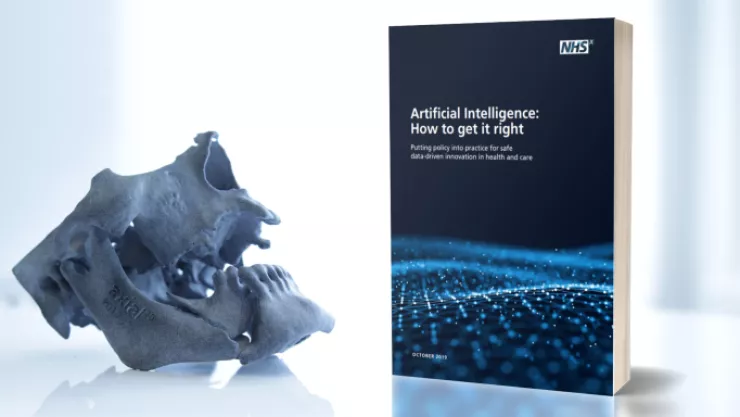The AI report from NHSX, showcases the organizations and technologies across the country that are helping to accelerate the digitization of health and care in the UK.
Axial3D is proud to have been showcased in the report as one of the organizations helping the National Health Service to achieve the NHS Long Term Plan through an innovative approach using Artificial Intelligence. Below, you can find the case study featured in the report, which highlights Axial3D’s innovative approach to 3D printing for hospitals in the NHS.
The NHSX report, ‘Artificial Intelligence: How to get it right’, sets out to highlight the technologies that can make the NHS even better at what it does: treating and caring for people. It also explains how the NHS is putting policy into practice for safe, data-driven innovation in health and care.
According to the report, “Artificial Intelligence (AI) has the potential to make a significant difference to health and care. A broad range of techniques can be used to create Artificially Intelligent Systems (AIS) to carry out or augment health and care tasks that have until now been completed by humans, or have not been possible previously; these techniques include inductive logic programming, robotic process automation, natural language processing, computer vision, neural networks and distributed artificial intelligence. These technologies present significant opportunities for keeping people healthy, improving care, saving lives and saving money for the pilot digital technologies. It could help personalized NHS screening and treatments for cancer, eye disease and a range of other conditions, for example. Furthermore, it’s not just patients who can benefit. AI can also support clinicians, enabling them to make the best use of their expertise, informing their decisions and saving them time.”
NHSX brings teams from the Department of Health and Social Care, NHS England and NHS Improvement together to drive digital transformation and lead policy, implementation, and change.
Artificial Intelligence: How to get it right


Each person is unique, and each operation will be too, more-so in the cases of complex or novel procedures. A complex surgical procedure involving variant anatomy may be the first of its type seen by a surgeon, even in a specialist center, and providing surgeons with the ability to anticipate and manage for the operation in advance can have a great impact on outcomes.
Axial3D is helping to transform surgery by providing previously unavailable insights to clinicians for preoperative planning across the world. Axial3D produces highly accurate 3D printed models of specific parts of the patient’s own anatomy. Based on patient scans, Axial3D uses machine learning-based segmentation algorithms to automatically produce patient-specific 3D anatomical models which can be created and delivered in 24-48 hours.
These anatomical models can be used by surgeons to plan for complex procedures, gain patient consent and minimize inter-clinician variability. This results in better clinical outcomes for patients, enhanced insights for surgeons, and reduced time and costs for the surgery. Patients are also much better informed about their condition ahead of the proposed surgery when a 3D printed model is used in gaining consent.



